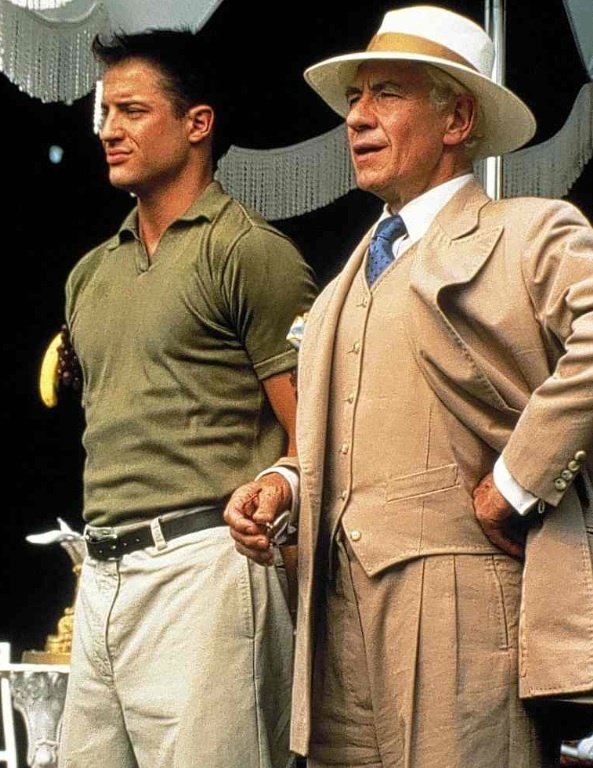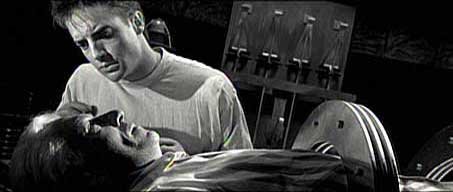Gods and Monsters Is a Powerful Character Study with a Revelatory Performance From Brendan Fraser
looking good!
In his radiant, Clinton-era prime, Brendan Fraser had the body of a Greek God, the delicate, androgynous face of an angel and the personality and infectious energy of a child, if not a particularly friendly golden retriever puppy.
Bill Condon’s Gods and Monsters made better and different use of The Mummy star’s physicality and deceptively complicated sexuality than any film before or since. Fraser is an unusually physical performer and the plum role of Clayton Boone in Gods and Monsters is unusually physical.
By day the aimless, rudderless former Marine uses his towering frame and rippling muscles to tend to the gardens of the rich and famous, most notably James Whale (Ian McKellan), the legendary director of Frankenstein, Bride of Frankenstein and Showboat. By night, the rough-hewn laborer hangs out at a scuzzy dive bar where he picks up women for one-night stands in his trailer home.
Clayton’s beautiful face and ripped body are what initially attract the attention of Whale as he tends to the retired filmmaker’s lawn, his rugged physique positively glistening with sweat in the pounding sun.
To relieve the agonizing boredom of tasteful retirement, and out of sexual desire, the famous British filmmaker asks the rugged young stud to sit for him and act as his model.
Through his friendship with Whale, Clayton’s youth and beauty grant him entryway into a world he has never known. It’s a rarified realm of movie stars and swimming pools, mansions and parties, art and privilege. It’s also an explicitly gay world utterly foreign to the stoic, macho younger man.
Movies about prominent real-life gay celebrities have a long, unfortunate history of either playing down their sexuality or ignoring it completely. Not Gods and Monsters. Condon’s adaptation of Christopher Bram’s novel Father of Frankenstein allows Whale to be not just explicitly, incontrovertibly gay but also intensely sexual, even hyper-sexual.
The film’s depiction of Whale in the twilight of his years does such a brilliant job of avoiding the usual cliches and stereotypes about gay men who choose to live their truth at a time when staying in the closet was invariably the safer option that it seems a shame that he ultimately meets the same tragic fate as so many gay film characters through the decades.
Early in Gods and Monsters Whale suffers a stroke that miraculously leaves his faculties relatively unharmed while ensuing that his condition will only worsen with time. The job of a director is to be in control but Whale finds himself in the unenviable if unfortunately common position of gradually losing control over his body and his mind as he continues to deteriorate.
In hokey black and white fantasy sequences the director alternately adopts the form of Frankenstein’s Monster, a figure at once terrifying in his raw power and heartbreakingly poignant in his child-like inability to understand the world around him and his place in it, and Dr. Frankenstein, who has the God-like power to create life yet is not powerful enough to control his misbegotten creation.
Fraser seems to have been cast at least partially because he has the towering frame and hulking physique of a modern day prometheus, a sexy, sexy Frankenstein. But these dream sequences nevertheless reek of cheap psychology, of dime-store Freudianism.
The same is true of copious flashbacks to every stage in the director’s life, from his Dickensian childhood as a misfit child of the slums to formative early experiences as a solider in World War I, where he fell in love with a fellow soldier whose death affects him as profoundly in old age as it did at the time it occurred, and the making of Bride of Frankenstein.
When Gods and Monsters was made, consummate late bloomer Ian McKellan was robust enough to be able to convincingly play Whale in his dying days in the 1950s as well as when he directed Bride of Frankenstein decades earlier.
McKellan plays Whale as someone who is exhausted by age and disease yet paradoxically brimming with humor and life, with lust and romantic longing. The horror filmmaker plays the harmless, feeble old man card with Clayton as a way of assuaging his fears about his amorous intentions but McKellan makes him an indomitable force of nature rather than a spent figure.
In a masterful, rightly acclaimed Academy Award nominated performance, McKellan captures the character’s complicated, fraught combination of strength and vulnerability, professional and economic power and emotional powerlessness.
McKellan is the rare actor who can wear a neckerchief without looking like a pompous boob. He’s one of those rare, miraculous creatures that only seems to grow more powerful with time.
A movie to get lost in, Gods and Monsters depicts the home where Whale lives as his version of Robert Evans’ legendary safe haven Woodland.
It’s a tastefully appointed, art-filled paradise as elegant and classy as its owner’s wardrobe. But it’s also a hopelessly lonely place and a paradise with no one to share it with represents a special form of hell, one Whale is only too familiar with.
Whale shares his home with Hanna (Lynn Redgrave), a stern housekeeper who is fiercely protective of her employer despite her fierce religious convictions about his sexuality and an assortment of ghosts: ghosts of lovers past, ghosts of war and ghosts of the power and influence he used to wield.
As the iconic frightmaster’s mental and physical health decline as he approaches his endgame, the lines separating fantasy from reality and the present from the past begin to blur.
For the World War I veteran, the hunky gardener functions as an object of lust but also as a receptive audience. Clayton, an ex-Marine, is fascinated by the filmmaker’s epic life and connections even as he’s taken aback by the bluntness with which the older man discusses his sex life and his still raging libido.
The film’s fictionalized version of Whale walks a fine line with Clayton in being out and unashamed without being overly aggressive. But he also takes pleasure in pushing past that line, to a place that makes Clayton profoundly uncomfortable. He keeps pushing and pushing and pushing until he reaches a place of no return that threatens the fragile but powerful bond he’s formed with Clayton.
Writers and actors tend to win Academy Awards for doing the most work rather than the best work. That’s true of Condon’s Academy Award-winning screenplay here. As a dual character study of two very different men from different worlds who form an unlikely but tender bond, Gods and Monsters is riveting and effortlessly authentic. But when it veers into psychodrama in its flashbacks and fantasy sequences it feels histrionic and overwrought.
Hollywood being Hollywood and the Academy being the Academy, however, it was probably these artsy, melodramatic flourishes that ultimately won it the big prize: an Oscar for Best Adapted Screenplay.
Condon loves this world so much, in fact, that a few years back he was slated to re-visit it as the director of a Bride of Frankenstein remake slated to be part of Universal’s widely mocked, quickly abandoned plan to create a Marvel-style franchise out of its famous monsters collectively known as The Dark Universe.
The Bride of Frankenstein remake has been stuck in development hell for the past few years. If it does happen, it likely will not be with Condon in the director’s chair. That’s probably for the best. If the sorry history of remakes is any indication, a contemporary re-imagining of Bride of Frankenstein would probably detract rather than add to Condon’s tender, heartfelt and unmistakably human and humane triumph here.
Would you like to read an entire BOOK full of pieces like this? Then check out the Kickstarter for The Happy Place’s next book, The Fractured Mirror: Nathan Rabin’s Happy Place’s Definitive Guide to American Movies About the Film Industry here: https://www.kickstarter.com/projects/weirdaccordiontoal/the-fractured-mirror?ref=project_build
The Joy of Trash, the Happy Place’s first non-"Weird Al” Yankovic-themed book is out! And it’s only 16.50, shipping, handling and taxes included, 30 bucks for two books, domestic only!
PLUS, for a limited time only, get a FREE copy of The Weird A-Coloring to Al when you buy any other book in the Happy Place store!
Buy The Joy of Trash, The Weird Accordion to Al and the The Weird Accordion to Al in both paperback and hardcover and The Weird A-Coloring to Al and The Weird A-Coloring to Al: Colored-In Special Edition signed from me personally (recommended) over at https://www.nathanrabin.com/shop
Or you can buy The Joy of Trash here and The Weird A-Coloring to Al here and The Weird Accordion to Al here
Help ensure a future for the Happy Place during an uncertain era AND get sweet merch by pledging to the site’s Patreon account at https://www.patreon.com/nathanrabinshappyplace We just added a bunch of new tiers and merchandise AND a second daily blog just for patrons!
Alternately you can buy The Weird Accordion to Al, signed, for just 19.50, tax and shipping included, at the https://www.nathanrabin.com/shop or for more, unsigned, from Amazon here.
I make my living exclusively through book sales and Patreon so please support independent media and one man’s dream and kick in a shekel or two!









